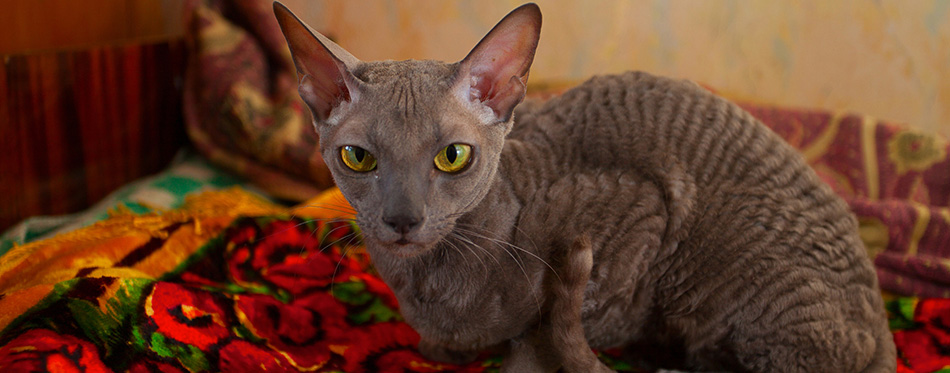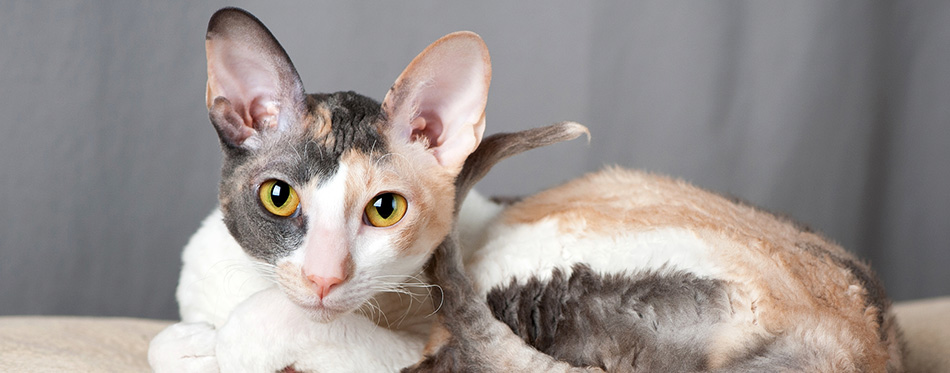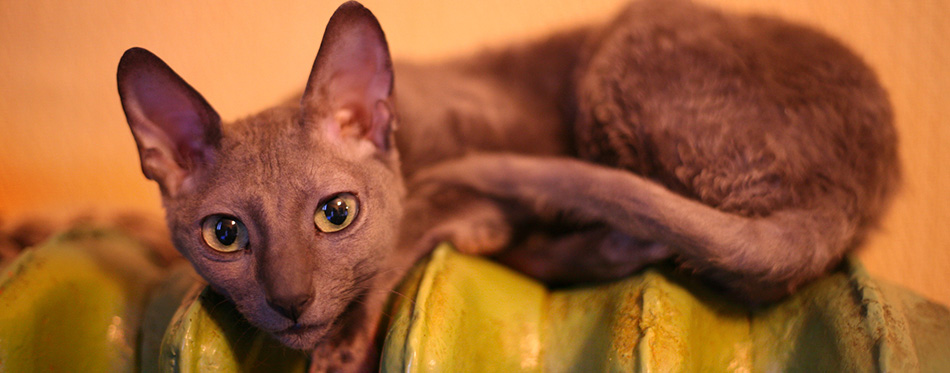One of the first things that people notice about the Cornish Rex is their striking and unusual appearance. But look beyond this and you will find cats who are friendly and outgoing. Ultimately, they make excellent companions for the whole family.
But if you still haven’t quite made your mind up or you are simply looking for more information on how to take care of your new Cornish Rex, this is certainly the blog post for you. We will tell you pretty much everything you need to know about this breed.
History of the Cornish Rex
As you would expect from the name, this breed of cat originates from Cornwall in the south of England. Unlike other breeds with origins that go back hundreds of years, the Cornish Rex can be traced directly to a specific cat called Serena. In the 1950s, she gave birth to five kittens. One of them was an unusual-looking, curly-haired orange and white male. The owner took the cat into a geneticist who confirmed that the kitten came from a genetic mutation. When the cat was fully-grown, she crossed it with the mother and three more kittens were born.
The ‘Rex’ part of the name came from the resemblance to the curly-coated Astrex rabbit. The gene pool was very small, so breeders had to cross them with other breeds such as Siamese, Havana Browns, and American Shorthairs to ensure they were genetically diverse. A wide array of colors and patterns came from these crossings.
It was 1957 when the breed was first introduced into America, and they proved to be an instant hit. This increased their popularity all over the world. In 1967, the Rex Cat Club was officially founded.

Quick Facts About the Cornish Rex
If you were to use three words to describe Cornish Rex cats, you would probably have to say long, thin, and muscular. Compared to the rest of their bodies, their heads are relatively small, but their ears actually appear quite large.
Cornish Rex cats come in a variety of different colors and patterns, and their eye colors can also vary in shades of hazel, yellow, brown, blue, and green. As for their weight, males tend to be between 10 and 13 pounds, while females range between 9 and 110 pounds. As far as cats go, they can grow quite tall – up to 14 inches at the shoulders.
The cost of a kitten should be between $900 and $1,400.
Their personality can certainly be classed as ‘active’, and you are likely to find them climbing around all over the place. They don’t like to be alone all that much, so you are likely to find them following you around on a frequent basis.
If you are an allergy sufferer, you may think that the Cornish Rex is a good choice due to their short fur. But allergies are caused by dander and dead skin, so these cats cannot be classed as hypoallergenic.
Relatively speaking, Cornish Rex has a long life span of between 11 and 15 years. You can put 13 years as the median, but it is not uncommon for this breed of cat to live up to 20 years old. And compared to many other kitties, they are actually very easy to take care of.
Things You Should Know
Now we come onto the ‘things you should know’ section of the article, which gives you plenty more information if you are thinking of bringing a Cornish Rex kitten or adult cat into your household. Each section details a different aspect of care. Added together, you have a fairly comprehensive guide about taking care of this type of cat.
Health
At first glance, Cornish Rex cats may not appear like they are amongst the healthiest out there. But there aren’t many genetic illnesses to worry about, which is unlike many other types of cat. However, a few of the conditions that they may be at a greater risk of developing include hypertrophic cardiomyopathy and hypothyroidism. The former causes the walls of the heart muscle to become thickened, which negatively impacts its ability to pump blood around the body. This can manifest itself as a rapid, slowed, or irregular heartbeat. If left untreated, the condition could end up being fatal.
Due to their type of fur, you need to be especially wary of certain weather conditions. First, they aren’t great in cold weather and should be kept clear of cold drafts, if possible. Kittens are in a particularly risky situation. If you are planning on taking a trip, a special travel bag is a useful piece of equipment to invest in. Sunburn is also a potential risk, so don’t let your cat out for too long on days when the sun is beating down. Another skin condition that can affect Cornish Rex cats is seborrhea, which comes as a result of the skin producing too much of the oily substance called sebum. Sometimes, cats with a more unusual coat such as this one can suffer from alopecia or hair loss. This risk increases if they don’t get enough LPAR6 protein as their fur is fragile and liable to fall out.
As for other potential health risks, we have polycystic kidney disease (PKD) which is present from birth. Cysts in the kidneys gradually increase in size until the organs can no longer function properly. Genetic tests are available to determine whether or not your cat is at risk. Another possible problem is progressive retinal atrophy, which is a genetic eye issue that can progressively lead to blindness.
If possible, before adopting a kitten, it is worth checking out any health issues affecting their parents as this will tell you a lot about any risks.
Related Post: Cat Food for Kidney Disease
Feeding
Cornish Rex don’t have any specific dietary concerns that you need to know about, but if you want to keep their coat in good condition, it may be worth adding some extra fat to their diet. If you have a kitten, you should feed them accordingly. You also need to make the choice between wet and dry food – or a combination of both. With a little bit of observation, you will start to learn what your cat enjoys and understand more about their favorite flavors.
One of the most common problems that people have with Cornish Rex is just how much they love their food. You shouldn’t free-feed your cat as they will not be able to control their appetite. You should feed them a controlled amount of food a couple of times a day and monitor their weight closely. Obesity is one of the most common health issues amongst domesticated felines, but it is also one that can be easily controlled with a little bit of care. If you need help coming up with a feeding plan, you can always get in touch with your vet.
Along with food, your kitty always needs to have access to cool, fresh water. And you should wash out their bowls on a regular basis to prevent bacteria from building up.
For more guides on choosing the right cat food, you may wish to check out our reviews of the best wet cat food, senior cat food, hypoallergenic cat food, cat food for weight loss and high fiber cat food.

Care
Cornish Rex have a famously short coat, which makes the grooming aspect of taking care of your cat very easy indeed. We have already mentioned that these cats aren’t ideally suited to cold weather, which is why many people decide to keep their cats indoors. Other reasons for doing so include the risk that other animals pose and the risk that catnappers will want to steal their distinctive-looking moggy. You will need to properly catproof your house or apartment if you want to ensure that they can’t escape.
When it is cold inside, you should offer an extra blanket or two for your cat to wrap up warm. If possible, you can even train your kitty to wear a jumper or sweater! On hot days, Cornish Rex are at risk of sunburn, but you could tackle the problem with a cat-safe sunscreen. You will need to apply it to the places that are particularly exposed such as their ears and thinner patches in their coat. You may also like our article on heated cat beds.
If you live in a safe and secure area, it is perfectly okay to let your Cornish Rex roam free outdoors, teaching them to come back inside via a catflap. This gives them the opportunity to exercise their ‘wild side’. You can teach them to go to the bathroom and this gets rid of the problem of litter boxes.
Another important aspect of care is ensuring that your cat is properly stimulated both mentally and physically. Cornish Rex are well-known for their high energy levels, so it is worth investing in a range of accessories such as climbing frames, scratching posts, and toys. This is especially important if you spend a lot of time out of the house as this is not the kind of cat that will be content just snoozing all day, every day.
When they are bored, attention-seeking behavior is common, so you should put in the hours to play with your cat and build up a stronger bond between the two of you. If you ignore your cat too much, they are likely to create their own entertainment, which could include mischievous or destructive behavior. Provide your cat with a scratching post so they can work out their natural impulses and wear down their claws. Otherwise, this is going to get uncomfortable for them, and you will find your cat clacking all over the house. For more options, check out our detailed reviews of laser pointers for cats and cat toys.
Grooming
A major plus point about owning a Cornish Rex is the fact that they have a gentle coat which doesn’t need a great deal of grooming. Unlike many cats, it is better undergrooming rather than overgrooming as their delicate hairs can become easily damaged. But since their paws and ears are more exposed, you should get into the habit of cleaning both on a regular basis. When looking at their ears, you should try to spot things like mites, discharge, and irritation. Infections are often accompanied by a bad smell, so this will tell you if all is not right. You can use a cotton ball to clean the exterior of their ear, but you should never put anything directly into their ear canal. This is a job for the professionals.
Other important aspects of grooming include clipping their nails and brushing their teeth. The latter can prove to be a particular challenge that many cat owners steer clear of entirely. But if you don’t want your cat to suffer from any sort of dental disease, it is important that you continue brushing their teeth regularly. Otherwise, they are likely to need to have teeth pulled out at some point down the line. You need to start by getting used to you having your hands in their mouth. Later, you can gradually start introducing a cat toothbrush and toothpaste. Remember, you should never use anything that has been designed for humans. The toothbrushes are too hard, while the toothpaste could be potentially toxic to them. When you are clipping their nails, take special care to avoid cutting into the ‘quick’, which is the soft part below the nails themselves. This will be very painful and will result in a lot of bleeding.
For more help on cat grooming, you may wish to read our guides on the best cat ear cleaners, cat nail clippers, brushes for cats, cat grooming gloves and cat shampoos.
Temperament
Cornish Rex tend to be both outgoing and active. They are natural-born acrobats, and you are likely to find them testing their abilities and scaling up to higher ground whenever they get half an opportunity. While they are not as active as some other dogs, they can be ranked in moderate to high in activeness levels
They are friendly and fit well into many households. Their affectionate nature means that they get on well with both children and other animals. But they want to be an active member of the family and don’t want you to ignore their wants and needs. The ideal household will include people who have enough time on their hands to give their cat the attention it deserves.
As you would expect, Cornish Rex kittens are very bubbly and active. But their high energy levels keep them playing long after they have become a fully grown adult. Thanks to their intelligence, you can enjoy teaching them games such as fetch.
And we have already mentioned just how much they love their food, which is why it is especially important that you don’t fall into the trap of overfeeding, which is a common thing to do for many owners. If you are not careful, they will even try and take food from your own plate!
Final Thoughts
There are plenty of reasons why a Cornish Rex could be the perfect cat for you and your household. They are affectionate, bubbly, and a whole lot of fun. They don’t require a huge amount of grooming and general upkeep. However, you need to be aware that they are going to demand a lot of time and attention, and aren’t going to be content just sleeping away time on their own like other domesticated felines. Since they get on well with other family pets, this may not be such a problem if you have a multi-pet household.
Once you have made the decision to bring a Cornish Rex into your life and your home, you can then evaluate the different options available to you. Purchasing from a breeder is bound to incur a higher cost as they place a great deal of value in their breeding stock. This is especially true if they come as a result of careful and selective breeding. A reputable breeder should be entirely upfront with you about their kittens and exactly what you are purchasing. This includes whether they have already been vaccinated against certain diseases and if they have had any other services like spaying or neutering. You should expect to pay anywhere between $800 and $1,300. If you want a pet, it should be towards the lower end of the scale, and it will be at the upper end if you are looking for a showcat.
Be especially wary of anyone who seems to be quoting a price that is too good to be true as they may not be reputable. You should always meet them in person as it is much easier to fall into the trap of a scam online. Good breeders should be more than happy to answer any and all questions that you have. If not, you are better off taking your money elsewhere.
If you are looking for a lower priced Cornish Rex, you can buy a retired show cat. Occasionally, one will make it to your local animal shelter or cat rescue, so this is always an option worth exploring as it is a great thing to do.
Ultimately, if you are looking for a cat to form a strong bond with, and you are willing and able to put in the time and effort of caring for them properly, a Cornish Rex is the cat for you.
Source:
- About the Cornish Rex – The Cat Fanciers’ Association


